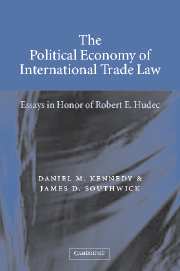Book contents
- Frontmatter
- Contents
- List of contributors
- Preface
- Foreword by E. THOMAS SULLIVAN
- Introduction: An overview of the volume
- Part I The constitutional developments of international trade law
- Part II The scope of international trade law: Adding new subjects and restructuring old ones
- Part III Legal relations between developed and developing countries
- Part IV The operation of the WTO dispute settlement procedure
- 15 Testing international trade law: Empirical studies of GATT/WTO dispute settlement
- 16 The Appellate Body and its contribution to WTO dispute settlement
- 17 A permanent panel body for WTO dispute settlement: Desirable or practical?
- Comment: Step by step to an international trade court
- 18 International trade policy and domestic food safety regulation: The case for substantial deference by the WTO Dispute Settlement Body under the SPS Agreement
- Comment: The case against clarity
- 19 Judicial supremacy, judicial restraint, and the issue of consistency of preferential trade agreements with the WTO: The apple in the picture
- 20 Should the teeth be pulled? An analysis of WTO sanctions
- 21 Problems with the compliance structure of the WTO dispute resolution process
- 22 “Inducing compliance” in WTO dispute settlement
- Bibliography of works by ROBERT E. HUDEC
- Index
17 - A permanent panel body for WTO dispute settlement: Desirable or practical?
Published online by Cambridge University Press: 02 September 2009
- Frontmatter
- Contents
- List of contributors
- Preface
- Foreword by E. THOMAS SULLIVAN
- Introduction: An overview of the volume
- Part I The constitutional developments of international trade law
- Part II The scope of international trade law: Adding new subjects and restructuring old ones
- Part III Legal relations between developed and developing countries
- Part IV The operation of the WTO dispute settlement procedure
- 15 Testing international trade law: Empirical studies of GATT/WTO dispute settlement
- 16 The Appellate Body and its contribution to WTO dispute settlement
- 17 A permanent panel body for WTO dispute settlement: Desirable or practical?
- Comment: Step by step to an international trade court
- 18 International trade policy and domestic food safety regulation: The case for substantial deference by the WTO Dispute Settlement Body under the SPS Agreement
- Comment: The case against clarity
- 19 Judicial supremacy, judicial restraint, and the issue of consistency of preferential trade agreements with the WTO: The apple in the picture
- 20 Should the teeth be pulled? An analysis of WTO sanctions
- 21 Problems with the compliance structure of the WTO dispute resolution process
- 22 “Inducing compliance” in WTO dispute settlement
- Bibliography of works by ROBERT E. HUDEC
- Index
Summary
The dispute settlement systems of the General Agreement on Tariffs and Trade (GATT) and the World Trade Organization (WTO) have generally been viewed as relatively successful examples of state-to-state dispute settlement. Yet despite this success, for many years there has been a degree of dissatisfaction with the decision-makers in the systems – the ad hoc panelists – particularly in respect of the manner in which they are selected and their expertise (or lack thereof). This essay first outlines the GATT procedures for panel selection. It then describes the WTO procedures and the current problems facing panel selection in the WTO. It then considers the advantages and disadvantages that might result from changing to a system relying on a small body of professional panelists to staff all WTO panels. In addition, the paper examines the practical aspects of implementing such a system.
The selection of panelists in the GATT dispute settlement system
Starting in 1952, disputes between GATT contracting parties that were submitted under GATT Article XXIII to the GATT CONTRACTING PARTIES for investigation and recommendations or rulings were in the first instance referred to panels of neutral individuals. Such panels heard the arguments of the disputants and issued reports to the CONTRACTING PARTIES setting forth the panels' views on the issues. The recommendations or rulings of the panels were typically adopted by the CONTRACTING PARTIES, although in some cases the absence of a consensus to adopt a panel report left the dispute unresolved.
- Type
- Chapter
- Information
- The Political Economy of International Trade LawEssays in Honor of Robert E. Hudec, pp. 496 - 527Publisher: Cambridge University PressPrint publication year: 2002
- 24
- Cited by



